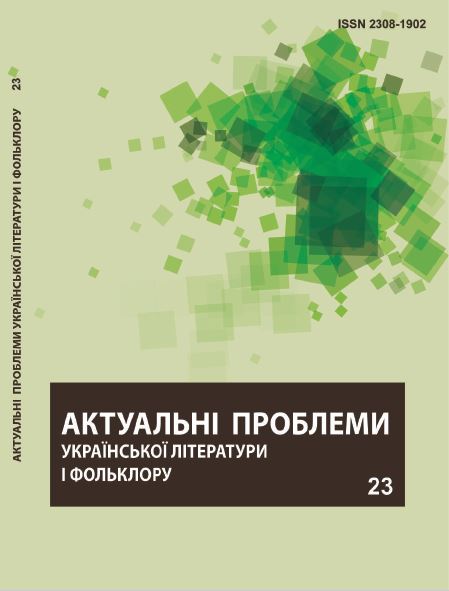Artistic interpretation of death in the lyrics by Vasyl Stus (based on the “Prison notebook”).
Keywords:
death, lyric, hagiography, hagiographic hero, lyric heroAbstract
The article deals with the problem of artistic interpretation of death in poetry by Vasyl Stus. The study examines the artistic realization of the lyrical hero’s spiritual quest. Alienation from the wealth of the earthly world, understanding the plight, understanding life as a martyrdom is a key motifs of poet’s verses. Based on observations by D. Stus, the author argues that the poet’s ethics as the motivation for his actions and aspirations is most clearly manifested in his creations. Accordingly, understanding of death in the poetry by Vasyl Stus investigated in terms of ethical coordinates. Poet’s appeal to the image of death, to the problems of sin and punishment were not exceptional phenomenon in the literature of the second half of the twentieth century. The article states that the lyrical hero feels like a stranger in the world. The author notes that although the lyrical hero feels the strength to survive in the struggle against injustice, he still is pending death. It was observed that catastrophism in the lyrics by Vasyl Stus is specific: the reader does not appear images of rocks, harbor, sea travel, disaster (as it is common in baroque tradition, pretty much similar in some motifs in Stus’s poetical world), but instead we see the flood plain, which falls in house, raft and so on. In this case, water is the symbol of universal matter, which absorbs everything. Theme of God in verses by Vasyl Stus is caused by desire to understand what the man begins with and where is the limit at which it loses its identity, independence, the possibility to make your choice. The author emphasizes that God for Stus’s hero is both philosophical and ethical category, the embodiment of the height and power of the spirit, the desire for heaven. In this sense, medieval and baroque-sounding motifs of death as the beginning of a new life sound in the lyric by Stus.References
Давньоруські любомудри / В. Горський, О. Вдовина, Ю. Завгородній, О. Киричок. – К. : Вид. дім «КМ Академія», 2004. – 304 с.
Жулинський М. Із забуття – в безсмертя (Сторінки призабутої спадщини) / М. Г. Жулинський М. – К. : Дніпро, 1990. – 447 с.
Коцюбинська М. Стусове “самособоюнаповнення” / Михайлина Коцюбинська // Сучасність. − 1995. – № 6. – С. 137–144.
Оникієнко І. Символ «веселий цвинтар» в «естетиці страждання» В. Стуса // Слово і час. − 1997. – № 2. – C. 9–11.
Стус В. Зникоме розцвітання // Стус В. Таборовий зошит: вибрані твори / упор. Д. Стус. – К.: Факт, 2008. – С. 356–373.
Стус В. Таборовий зошит: вибрані твори / упор. Д. Стус. – К. : Факт, 2008. – 452 с.
Стус Д. Етика Василя Стуса // Стус В. Таборовий зошит: вибрані твори / упор. Д. Стус. – К.: Факт, 2008. – С. 3–7.
Ткачук М. Типологія героя-екзистенціонала в ліриці Василя Стуса / М. Ткачук // Художнє слово Василя Стуса в контексті української та світової літератури: Матеріали V Міжнародної науково-теоретичної конференції, присвяченої вшануванню пам’яті письменника, літературознавця, мислителя і громадянина (Донецьк, 28 листопада 2013 р.). – Донецьк – Вінниця : ДонНУ, 2015. – С. 153–167.
Шевельов Ю. Трунок і трутизна. Про «палімпсести» В. Стуса / Юрій Шевельов. – К., 2001. – 500 c.
Ушкалов Л. Есеї про українське Бароко / Леонід Ушкалов. – К. : Факт – Наш час, 2006. – 284 с.

